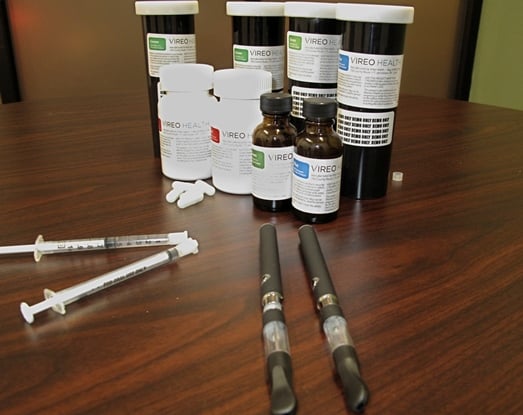This fall, efforts to legalize the use of medical marijuana havecontinued to gain momentum.
|Related: Medical marijuana saving Medicaremillions
|In the November 2016 elections, medical marijuana was approvedthrough four state ballot measures, bringing the total to 28 statesand the District of Columbia that have now legalized medicalmarijuana in one form or another.
|Some states have only legalized cannabidiol, a specificcomponent of marijuana, and continue to prohibit THC, the compoundthat makes a person feel high.
|Under the Controlled Substance Act of 1970, however, marijuanais still classified as a Schedule I substance, making it illegal atthe federal level. Amid contradictory directives at the state andfederal levels, many workers’ compensation payers are choosing tocategorically deny coverage.
|They’re within legal and medical parameters to do so, becausemedical marijuana is not currently included in any workers' comptreatment guidelines — such as the Official Disability Guidelinesand the American College of Occupational & EnvironmentalMedicine practices guidelines — which are considered the goldstandards for treatment of occupational injuries.
|Related: Using worker's compensation insurance to helpemployee health and safety
|As such, the future of medical marijuana in workers' compremains unclear. Consider the latest pros and cons surrounding theissue:
|
In this Jan. 5, 2016, file photo, packaging for medicalmarijuana is displayed at Vireo Health of New York, a dispensary inWhite Plains, N.Y. (Photo: Jennifer Peltz/AP Photo)
|Pro: Potential alternative for painmanagement
There is significant interest in using medical marijuana as analternative to opiates for the management of chronic pain. In June2015, the “Journal of the American Medical Association” reportedthat existing clinical trials showed medical marijuana effectivelytreats chronic and neuropathic (nerve) pain. However, large-scale,randomized studies are still required to confirm these results.
|Con: Workplace risks
In states that have legalized medical or recreational marijuana,workplace safety is a concern.
|Employers have a responsibility to foster an environment devoidof recognizable hazards that could cause harm or death.
|If a company employs a medical marijuana user, this person mightexperience side effects, such as impaired cognition, balance andcoordination or decreased alertness and delayed reaction time — allof which could result in workplace injuries. Use of cannabidiolwould deliver some of the alleged medical benefits whilesignificantly reducing intoxication. But some side effects mightstill be experienced. More research is needed in this area.
|Related: More workers testing positive fordrugs
|
Brandon Coats, a quadriplegic medical marijuana patient whowas fired by the Dish Network after failing a drug test, right,waits for the proceedings to begin with his mother, DonnaScharfenberg, at the Colorado Supreme Court in Denver on Sept. 30,2014. Coats’ case highlights the clash between state laws that areincreasingly accepting of marijuana use and employers’ drug-freepolicies. (Photo: Kathryn Scott Osler/The Denver Post via APPhoto)
|Pro: Current use of medical marijuana in workers'comp
The New Mexico Court of Appeals ruled three times since May 2014that medical marijuana was “reasonable and necessary” for injuredworkers and had to be covered under workers' compensation.
|In these cases, injured employees were authorized to use medicalmarijuana after traditional therapies failed to relieve their pain.The respective employers were ordered to reimburse the injuredworkers for medical marijuana, and the reimbursement processenabled the insurer to avoid directly paying for marijuana as it’sstill an illegal substance.
|Con: Drug-free workplace policies
Because marijuana continues to be categorized as a Schedule Isubstance, there are ramifications regarding drug-free workplacepolicies. For example, employees could be authorized to use medicalmarijuana but still be terminated if they tested positive formarijuana in a random drug test. Ironically, New Mexico — a statethat has deemed medical marijuana to be compensable under workers'compensation — has seen such a decision.
|Tractor Supply, a New Mexico employer, fired a new hire forusing medical marijuana, as it went against the company’s drug-freeworkplace policy. A federal court upheld the employer’s terminationin this situation. If the court had sided with the employee,Tractor Supply, which has stores in 49 states, would have had tomodify its drug-free policy for each state that has legalizedmedical marijuana.
|The Garcia v. Tractor Supply decisionmirrors one made by the Colorado Supreme Court in June 2015.In Brandon Coats v. Dish Network LLC, thecourt affirmed Dish Network’s termination of an employee forsmoking marijuana outside of work, even though the employee waslegally registered under Colorado law to use medical marijuana.
|Related: Congress still denies vets access to medicalmarijuana
|
In this photo taken May 2, 2014, Kari Boiter, of Tacoma,Wash., poses for a photo at Rainier Xpress, a medical marijuanadispensary in Olympia, Wash. Boiter says marijuana replacedprescription drugs such as steroids and antidepressants that werenearly ineffective for her. More states allow the medical use ofmarijuana, but major insurers still don’t cover its cost. (Photo:Ted S. Warren/AP Photo)
|Pro: Pending legislation at the federallevel
The Compassionate Access, Research Expansion andRespect States Act is currently stalled in the U.S. SenateJudiciary Committee. If passed, this act would recognize thatstates have the responsibility to set marijuana policy. It wouldalso reclassify marijuana from a Schedule I to Schedule IIsubstance, acknowledging that it has “Accepted Medical Use.”
|Con: New Mexico rethinks reimbursement
New Mexico previously demonstrated considerable support formedical marijuana, and it continues to be at the center of thiscontroversy. In November 2015, it became the first state to pass areimbursement rule for medical marijuana. Under this rule, workers'compensation claimants could be reimbursed up to $12.02 per gram ofmarijuana for up to 226.8 grams per year.
|However, in November 2016 — just a year after the initialreimbursement rule was proposed — the state is now putting forwarda bill that says workers' compensation insurers and employers wouldnot be liable to reimburse injured workers for medical marijuana.The bill is still under consideration, but it would bring the statein line with recent federal court decisions that have allowedemployers to fire employees for medical marijuana use.
|Related: Pro-pot votes could set up a showdown withTrump
|
In this Dec. 4, 2015 photo, books about marijuana lay on atable in the office of University of Vermont pharmacology professorWolfgang Dostmann in Burlington, Vt. The university has one of thefirst accredited academic programs in the country to offer apharmacology class on medical cannabis. Professors said they arehampered by a lack of research on the topic. (Photo: Lisa Rathke/APPhoto)
|Pro: Obama administration broadensresearch
In August 2016, the Drug Enforcement Administration was asked toreassess marijuana’s classification.
|Although the DEA decided to retain its current categorization,the Obama administration said it would be easier for researchers tostudy marijuana’s medical benefits by expanding the number ofentities that can apply to legally grow marijuana for researchpurposes.
|Currently, only researchers at the University of Mississippi areallowed this privilege, as part of a contract with the NationalInstitute on Drug Abuse. Researchers will need approval fromfederal agencies, such as the DEA and Food and Drug Administration,to conduct studies of marijuana. However, this decision is a majorstep toward removing barriers to clinical research that couldultimately provide the scientific information needed to supportreclassification.
|CON: Too early to tell what Trump administration woulddo
It’s too early to anticipate what President-elect Donald Trump’sofficial policies will be in regards to medical marijuana, butwhile he was on the campaign trail, he said he was in favor ofrescheduling marijuana from its current illicit status as aSchedule I substance to Schedule II.
|Related: Pot not a gateway to opioids, YouGov surveysays
|Ongoing changes ahead
The pros and cons outlined here are among a few of the mostrecent developments related to the use of medical marijuana inworkers' compensation.
|Nationwide, new legislation and court decisions are continuingto develop, which will affect workers' comp treatment decisions.The discrepancy between state and federal law, particularly inregard to drug-free workplace policies, will need to beresolved.
|In the meantime, workers' comp professionals should continue tomonitor new bills and judgments — as well as public sentiment andpolitical trends — that will have ongoing ramifications for theindustry and could forecast a tipping point towardreclassification.
|Kevin Glennon, RN, is vice president of clinical programs atJacksonville, Florida-based claims management company One CallCare Management. Email him at [email protected].
Complete your profile to continue reading and get FREE access to BenefitsPRO, part of your ALM digital membership.
Your access to unlimited BenefitsPRO content isn’t changing.
Once you are an ALM digital member, you’ll receive:
- Critical BenefitsPRO information including cutting edge post-reform success strategies, access to educational webcasts and videos, resources from industry leaders, and informative Newsletters.
- Exclusive discounts on ALM, BenefitsPRO magazine and BenefitsPRO.com events
- Access to other award-winning ALM websites including ThinkAdvisor.com and Law.com
Already have an account? Sign In
© 2024 ALM Global, LLC, All Rights Reserved. Request academic re-use from www.copyright.com. All other uses, submit a request to [email protected]. For more information visit Asset & Logo Licensing.








